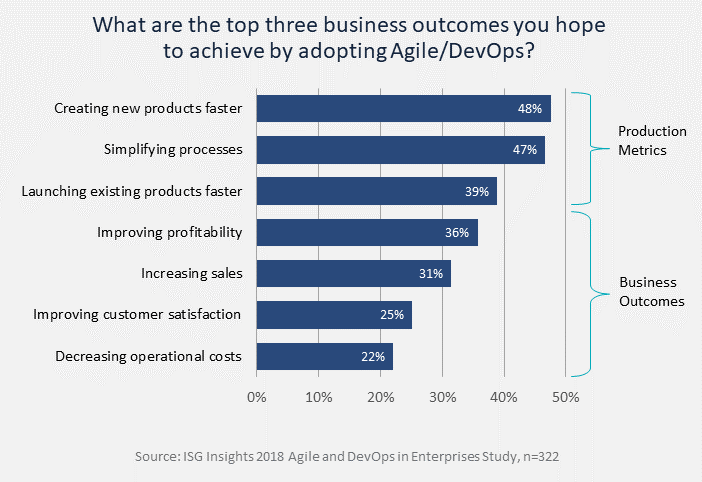Enterprises competing in an increasingly digital economy must simultaneously improve performance on four levels. They need to increase speed to market for customer-facing products, improve flexibility in business-supporting capabilities, boost product quality, and raise financial performance. Agile and DevOps practices are critical to achieving these four goals and to maintaining competitive resilience.
A new ISG Insights study, “Agile and DevOps in 2019: Enterprise Culture is Key” uses a combination of primary research, insights from the study’s 300+ participants, practical advice from ISG advisors and predictions from enterprise digital transformation leaders to provide a 360-degree view of where companies are in their development journeys, and how they perceive their Agile and DevOps capabilities now and in two years.
Based on years of client interactions and this study’s findings, ISG knows:
- These aren’t fads. Most ISG clients are using Agile and DevOps to at least some capacity in their organizations. Forty two percent of development projects in the study use Agile methodologies, growing to 45 percent by 2020.
- Agile principles often go beyond software development. The core concepts of Agile development methods, when applied in the context of the entire business, can help organizations operate better.
- DevOps is about culture and collaboration more than tools. The findings of this study reinforce ISG’s assertion that success with DevOps comes to those companies that place more importance on culture change than on technology and tools.
- There’s a premium on business knowledge. Improving speed to market and responsiveness to the business require more than faster code release, development projects need business perspectives and support.
- Team organization and make-up are built to suit. Industry and business knowledge, plus generalist capabilities in staff, are becoming a true differentiator in team models. Co-location of teams often depends on the history of the organization and location of skills needed.
One of the most interesting findings to come out of the study is that 59 percent of those who consider their development projects predominantly Agile say they can create new products faster. The study findings show that enterprises in all industries and geographies are prioritizing the creation and launch of products and the simplification of processes (Figure 1).
Figure 1: What are the top three business outcomes you hope to achieve by adopting Agile/DevOps?

Source: ISG Insights 2018 Agile and DevOps in Enterprises Study, n=322
Speed in responding to the market or business, testing ideas, launching capabilities and providing simplified processes to the consumer and customer bases are the key aims for organizations using Agile and DevOps. The business aim is to reap financial rewards more rapidly.
The full study reveals many more interesting findings about the current use of Agile and DevOps in enterprises. Contact us to learn how ISG’s Enterprise Agility practice can show you how you compare to industry standard in this growing field and how you can drive the right level of agility to the right business areas at the right time.
Associated Insights
Four Key Principles of Enterprise Agility and their Benefits
About the authors
Ola is an IT transformational thought leader with over 25 years of leadership experience within various industries helping enterprises make transformation change. She is a seasoned professional with expertise in emerging delivery models that contemplate the rapidly changing technology landscape. She has advised corporations in the opportunities related to emerging technologies, and is fluent in Enterprise Agility, DevOps, cloud, and automation. Ola leads ISG's Enterprise Agility practice in the Americas.
Ron’s research agenda is on the cutting edge of location intelligence, the Internet of Things and application modernization with analysis of market trends, provider positioning, deployment challenges and opportunities. With a passion for bridging the gap between business and technology, Ron helps deliver go-to-market strategies for enterprise solution providers in data science, data management, cloud services and analytics. He also works with vendors to develop and execute sales/marketing strategies, competitive analyses, product roadmaps, profit and loss analyses and pricing plans. His integrated systems view means he looks across technologies and business areas to evaluate true market potential and affects. Ron has authored dozens of thought leadership reports for the ISG Insights service.
